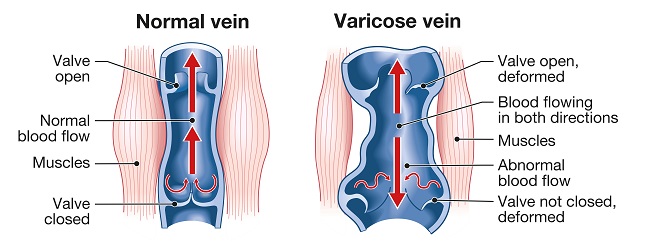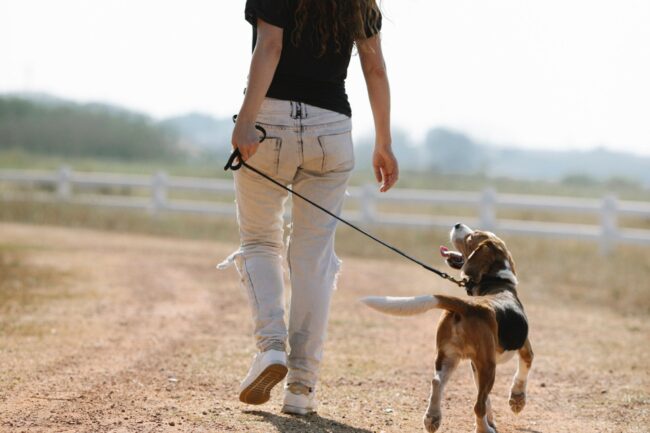Treating varicose veins involves sealing them off from your circulatory system or removing them entirely. But after varicose veins removal, won’t circulation be affected? Don’t you need the vein that’s getting treated? The shorter answer is no. Read on to find out why.
Varicose veins aren’t efficient
First, varicose veins are already inefficient at moving blood to the heart. They form when their tiny valves – responsible for stopping the backward flow of blood – malfunction, causing blood to pool inside the vein. Pooling (aka refluxing) blood expands the vein walls, making it even more difficult for the faulty valves and remaining healthy ones to close.

Illustration showing varicose veins and normal veins
It’s the superficial veins that turn varicose
Second, it’s almost always the superficial veins that turn varicose. These are small vein branches that carry deoxygenated blood back from tissues like skin and muscle into the deep veins, which then carry it off to the heart.
As you can imagine, there are tons of superficial veins throughout the body. However, they’re collectively responsible for only 10% of your total blood flow. So with one superficial vein branch sealed or removed, your body can easily reroute blood flow through neighbouring healthy veins.
What if it’s a deep vein that’s varicose?
Deep veins are much larger than superficial veins and are, relatively speaking, a lot more important. Fortunately, these veins are less likely to turn varicose as they have more support from surrounding muscles to help pump blood upward.
However, there is still a risk of a valve malfunction. And unfortunately, since deep veins are so vital for your circulation, specialists won’t be able to seal them off or perform a varicose veins removal.
But there are ways to manage a deep varicose vein:
- Regular exercise. Low-impact sports and workouts that activate the muscles around the varicose deep vein will help move blood along.
- Compression stockings. These will activate the muscles and gently compress bulging vein walls to make it easier for valves to shut.
- Healthy diet. Eating foods rich in Vitamins C, D, and E, flavonoids, and omega-3 fatty acids will help keep your vein walls strong.
- Elevating your legs. Most of your veins have to fight against gravity to get blood to the heart. By elevating your legs (or any other affected body part), you’ll ease the pressure on them.
- Not sitting or standing too long. If you have varicose leg veins, move around every 30 minutes. Take a little walk, stretch, or do some squats and calf raises. Your veins rely on your muscles to move blood, so every little movement helps.
Additionally, there are some experimental valve-stitching treatments. However, their effectiveness has yet to be thoroughly tested and proven.
So, what exactly happens after varicose veins removal or sealing?
Today, there are tons of varicose vein treatments available to you. These include:
- Thermal sealing treatments like EVLA and RFA
- Substance-sealing treatments like sclerotherapy, ClariVein, and Medical Superglue
- And surgical removal via ligation, stripping, or phlebectomy.
As we mentioned, after we treat a varicose vein, it’s sealed off from the rest of the circulatory system. Essentially, no blood can travel through it. And without that avenue, your body will reroute blood flow to neighbouring veins so they can carry cellular waste and deoxygenated blood out of tissues, through the liver and kidneys, and into the heart. Over time, if your body deems it necessary to do so, it can also grow new vein branches in that area.
As for the varicose vein, if it was removed, it will be gone. And if it was sealed, your body will simply absorb it.
Seek specialist advice
At The Vein Institute, we specialise in treating varicose leg veins. So whether you want to treat a varicose vein or get personal recommendations for symptom management, give our Sydney varicose vein clinic a call on 04 2010 2637.
See our other locations and book online: Contact Us | The Vein Institute | Varicose Vein Clinic

